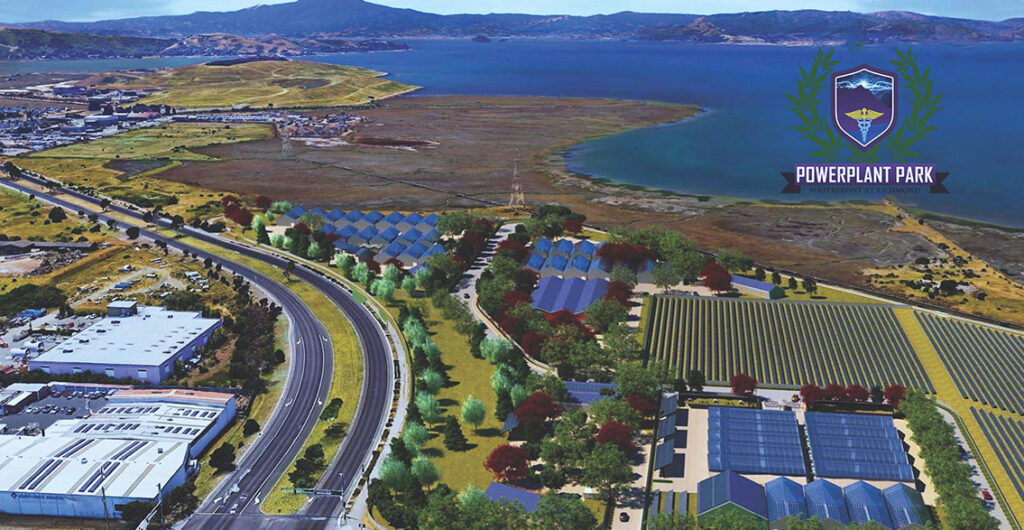ppp21 / January 14, 2022
Richmond plants seed for cannabis grower project that could bring city hundreds of jobs and millions of dollars
Entrepreneurs may no longer need to choose between San Francisco or Oakland to launch a venture in cannabis cultivation following Richmond’s approval of an 18.8-acre grow operation, PowerPlant Park, that will house 160,000 square feet of rentable canopy space.
PowerPlant Park will consist of an 824,000-square-foot campus featuring a manufacturing and processing facility, 2 nursery’s, super-critical CO2 extraction lab, pre-roll assembly, compliant packaging, full-service restaurant, town hall and education center.
At capacity the Park will employ more than 500 people, becoming Richmond’s second-largest employer after Chevron. CEO Richard Treiber will act as landlord for 44 mixed-light hybrid greenhouses where tenants can grow and sell product as licensed micro-businesses — the first cannabis business model of its kind in the state, and possibly the country.

The development was unanimously awarded a conditional use permit by the planning commission on April 18th, following a formidable approval process that stretched 2½ years and required $2.5 million worth of investment. Despite the steep initial investment, Treiber said that working with the city “has been a dream, the city of Richmond as a whole has embraced our project.”
“It’s pretty nifty,” said Richmond’s mayor, Tom Butt, who for years has considered the tax boost commercial cannabis could bring to the city. Last year Richmond became one of the first in the state to regulate such businesses with a 5 percent tax.
In addition to the cannabis tax, Richmond will receive retail sales tax and property taxes. Employee wages will start at $27.50 per hour and PowerPlant will donate five percent of net profits to local schools and faith organizations. The company forecasts a first full-year gross profit of $44 million and net profit of $24 million based on projections from Phase I operations.
Mayor Butt was also sold on the project’s unique solution to a key challenge of cannabis cultivation: its enormous drain on energy resources for constant heat and climate control. That usage accounted for as much as 3 percent of the state’s total electricity usage, according to a 2012 Elsevier report. To prevent a drain on utilities, cannabis cultivators in Richmond are required to use 100 percent renewable energy.

“When you use a greenhouse, you’re getting 8-12 hours of free light and that can make operations more profitable,” Butt said. “Their model using upscale greenhouses is the wave of the future.”
Treiber is also in negotiations to purchase a 2 megawatt solar farm adjacent to the North Shoreline property that would cover 100% of the Park’s energy needs and allow PowerPlant to function as its own quasi-utility, selling excess solar power back to utilities and to tenants at a significantly reduced rate, making the operation as a whole, carbon negative.
This idea originated from the project’s lead architect, Andrew Butt, vice president of a local Richmond firm, Interactive Resources and son of mayor Tom. “Having a net-zero carbon facility and demonstrating that it can be feasible could lead others to try this as well,” Andrew said. “(Cannabis) is such a highly regulated market type, and they need all the help they can get.”
